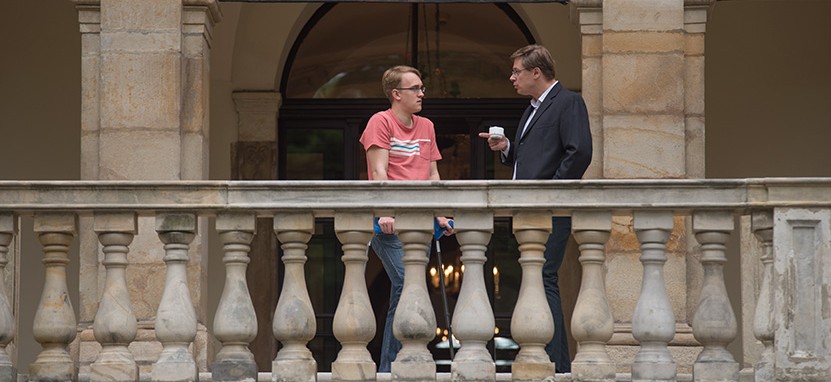
Friday in Villa Decius was about going deep into all the complexities of macro-regional challenges. What is “the homework to be done” for the reconciliation between Slovakia and Hungary? What makes EuroMaidan a specific event of its kind? You can find out what were our lecturers’ answers.
Reconciliation between Slovakia and Hungary never materialized into anything meaningful, despite the fact that there were many attempts – opened his Friday morning lecture Michal Vašečka, professor at Masaryk University in Brno, head of the Centre for Research of Ethnicity and Culture – Slovak partner organization of Visegrad Summer School. Vašečka based his lecture on capturing the factors standing behind the lack of successful attempts of reconciliation.
According to Michal Vašečka, the problems are very much rooted in the different historical narratives present in Hungarian and Slovak public and academic discourse. The lack of mutual understanding, the negative representation of the other for example in history textbooks used in public education, the dominance of stereotypes and prejudices in the representation of the other are among others the main elements influencing Hungarians perception of Slovaks and vica versa.
One has to acknowledge, that there are fundamental changes both Slovak and Hungarian society are undergoing. However, as Vašečka concluded the results of a research conducted among Slovak students: although the members of the young generation are strengthening their particular and universalistic identities instead of their national ones, their attitudes towards Hungarians do not change significantly.
“There is homework to be done on both sides”- concluded his lecture Michal Vašečka, saying that finding mutual understanding and common narratives and avoiding the over-ethnicization of the public discourse are indispensable steps on the way leading towards successful reconciliation.
„The protest is to be human, polite, caring”
The second lecture of the day was held by Vlodymyr Yermolenko, Ukrainian philosopher, essayist and political analyst, which could not be about anything else but EuroMaidan that is the mass demonstrations in Kyiv that took place at the beginning of this year.
Capturing what differentiates EuroMaidan from other protest for example in Western Europe is that while in the latter case protesters act against a polite society therefore using impolite behavior in the first case – the case of Ukraine – protesters found themselves in an cruel, rude, oppressive and inhuman world, so they started to use human, polite and caring behavior as a counteraction.
“EuroMaidan is a human-size agenda” – said Yermolenko – “It’s all about human faces”. Although, he added: the events that took place in Ukraine can be interpreted in a broader context of power structures. As the protests started after Viktor Yanukovich former president refused to sign the Ukraine-European Union Association Agreement being under pressure by Russia, according to Yermolenko’s interpretation EuroMaidan was the result of a shift in the global position of Russia – a shift from a rather defensive position to an aggressive, expansionist one. “This strategy of Russia is a major threat not only to Ukraine, but to Europe as well” – added Yermolenko, closing his lecture.
Eszter Neuberger













